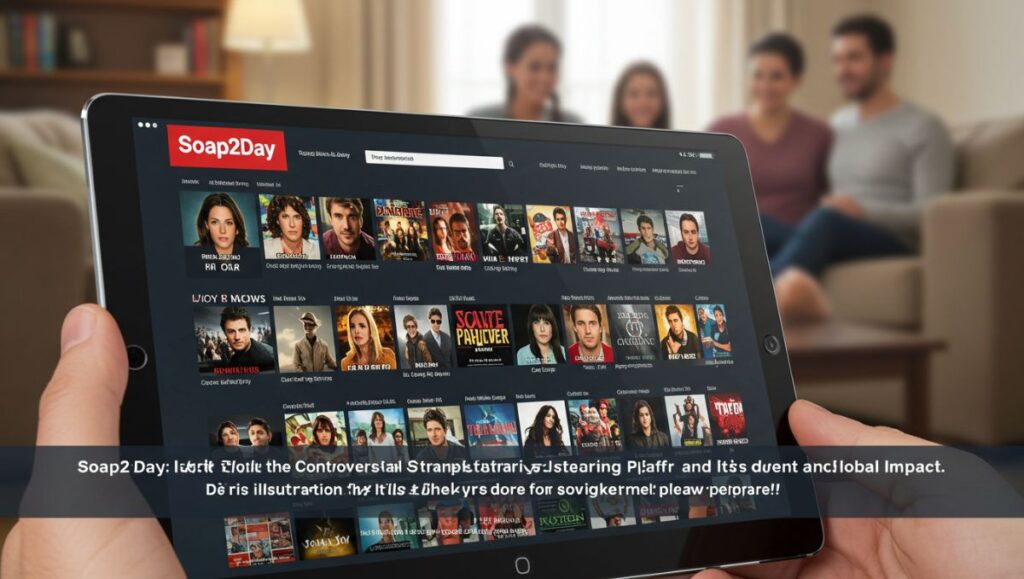In the digital entertainment era, audiences want instant, affordable access to movies and TV shows. While streaming giants like Netflix, Hulu, and Disney+ dominate the market, free streaming sites have emerged as alternatives for users seeking cost-free options. Among them, Soap2Day became one of the most recognized — and controversial — names in online streaming.
Offering a vast collection of movies, TV series, and live content without subscriptions or sign-ins, Soap2Day quickly attracted millions of users worldwide. However, its rise also sparked debates over copyright infringement, legality, and cybersecurity risks, making it one of the most talked-about platforms on the web.
What Is Soap2Day?
Soap2Day is an online streaming website that allows users to watch and sometimes download movies and TV shows for free, often without registration. Launched around 2018, the site’s design mirrored legitimate platforms — offering a user-friendly interface, advanced search filters, and trending lists.
The platform became popular because it hosted a wide range of content, from Hollywood blockbusters to foreign films, sports streams, and TV episodes — all available instantly.
However, what made Soap2Day appealing to users also made it problematic for authorities: it provided copyrighted content without proper licensing or distribution rights.
How Soap2Day Works
Unlike legal streaming platforms, Soap2Day doesn’t host original content. Instead, it aggregates links from various third-party servers, directing users to streams hosted elsewhere on the internet.
The website typically features:
-
A catalog of movies and series updated daily.
-
Multiple mirrors or domain names (like
soap2day.to,soap2day.ac,soap2day.sh, etc.) to bypass restrictions. -
Pop-up ads and redirect links, which are the main revenue sources.
These characteristics allow the site to operate outside traditional business models, but they also expose users to potential security threats and legal risks.
Why Soap2Day Became So Popular
Despite its controversial nature, Soap2Day gained a massive global audience for several key reasons:
1. Free Access to Premium Content
The most obvious attraction was that Soap2Day offered movies and TV shows without any cost. For users in regions with limited access to paid platforms, it provided a gateway to global entertainment.
2. No Registration or Subscription
Unlike legitimate streaming platforms requiring credit cards or subscriptions, Soap2Day allowed instant access without logging in — making it anonymous and easy to use.
3. Wide Range of Content
From recent releases to classic titles, the platform hosted a diverse library catering to all interests and age groups.
4. Accessibility and Speed
With simple navigation and minimal buffering, Soap2Day offered a smooth viewing experience that rivaled paid services.
5. Global Reach
Its mirror domains ensured availability across different countries, even when some versions were taken down by authorities.
The Legal and Ethical Issues
While convenient, Soap2Day’s operations raise serious legal and ethical concerns. The site provides access to copyrighted content without authorization, violating intellectual property laws in most countries.
1. Copyright Infringement
Each movie or TV show streamed through Soap2Day is often a pirated copy. Users may think they’re watching harmlessly, but streaming or downloading pirated media can be illegal depending on local laws.
2. Domain Seizures and Shutdowns
Over the years, various Soap2Day domains have been seized, blocked, or blacklisted by authorities and internet service providers (ISPs). Despite this, new domains frequently appear, making it difficult to permanently shut down the network.
3. Ethical Implications
Piracy impacts the entertainment industry significantly — reducing revenue for studios, actors, and production teams. By choosing illegal streaming sites, users inadvertently contribute to this loss.
Cybersecurity and User Risks
Beyond legality, Soap2Day poses technical and privacy-related dangers for users. Since the platform operates without oversight or regulation, it often relies on third-party ads and links that can be malicious.
1. Malware and Pop-Ups
Users have reported that clicking on ads or links on Soap2Day can trigger malware downloads or redirect them to phishing sites. These malicious pop-ups can compromise personal data or infect devices.
2. Data Tracking
Some Soap2Day mirrors use tracking scripts to collect user information such as IP addresses, browsing habits, and location. This data can be exploited for targeted advertising or even identity theft.
3. Fake Mirror Websites
Because Soap2Day frequently changes domains, fake clones have multiplied. Many of these counterfeit sites are designed to scam users by mimicking the original site’s design and asking for personal details or payments.
Legal Alternatives to Soap2Day
As governments and studios crack down on illegal streaming, numerous legal alternatives have emerged that offer affordable or even free entertainment options.
1. Free Ad-Supported Platforms
-
Tubi TV – Offers a vast library of films and series free with ads.
-
Pluto TV – Streams live channels and on-demand movies.
-
Crackle – Focuses on free streaming of movies and original shows.
2. Subscription-Based Services
-
Netflix, Amazon Prime Video, Hulu, and Disney+ provide high-quality streaming with proper licensing.
-
Paramount+, Peacock, and Apple TV+ cater to specific genres and exclusive releases.
3. Local Streaming Platforms
Many countries now have regional services that offer legal access to domestic and international content, often at much lower subscription rates.
Using these legitimate options ensures that content creators are fairly compensated, while viewers stay safe and compliant with the law.
The Cat-and-Mouse Game: Why Soap2Day Keeps Coming Back
Despite repeated shutdowns, Soap2Day continues to reappear under new domain names. This persistence is part of what experts call the “cat-and-mouse” dynamic between piracy sites and regulators.
How Soap2Day Survives:
-
Mirror Sites: The operators launch new URLs as soon as old ones are blocked.
-
Proxy Servers: These bypass regional restrictions and government blacklists.
-
Decentralized Hosting: Using multiple global servers reduces vulnerability to shutdowns.
-
User Communities: Fans share updated links through social media, Reddit, and online forums.
This decentralized structure makes Soap2Day difficult to permanently eliminate, even with international cooperation.
The Global Crackdown on Illegal Streaming
Law enforcement and copyright protection agencies worldwide have intensified their fight against illegal streaming networks like Soap2Day.
Key Enforcement Actions Include:
-
Domain Seizures: Authorities block or confiscate site domains.
-
Ad Network Bans: Major advertisers and payment providers are banned from supporting piracy sites.
-
User Warnings: ISPs in some countries send warning notices to users caught accessing illegal content.
-
Criminal Charges: Operators of such websites face heavy fines and imprisonment.
For example, Europol, the Motion Picture Association (MPA), and the Alliance for Creativity and Entertainment (ACE) continue to collaborate globally to shut down illegal streaming infrastructures.
The Cultural Impact of Soap2Day
While controversial, Soap2Day has undeniably influenced how people view entertainment accessibility. Its popularity exposed the global demand for affordable, flexible streaming options.
Millions of users, particularly in developing countries, turned to platforms like Soap2Day because legal alternatives were either too expensive or unavailable in their region.
As a result, many legitimate companies began rethinking their pricing and global access models — introducing budget-friendly tiers, regional discounts, and ad-supported versions to compete with illegal services.
In that sense, the rise of Soap2Day also forced the industry to innovate.
The Future of Streaming: What Comes After Soap2Day?
The streaming world continues to evolve rapidly. With increased awareness of cybersecurity and digital ethics, many users are moving away from piracy toward safe, legal streaming platforms.
As technology advances, the future will likely bring:
-
More affordable global streaming access.
-
Decentralized legal content platforms using blockchain verification.
-
Smarter copyright protection technologies powered by AI.
-
Enhanced user privacy in legitimate streaming environments.
Soap2Day’s legacy may be controversial, but it has undeniably shaped how audiences and industries approach the question of accessibility vs. legality in digital media.
Conclusion
The story of Soap2Day is both a cautionary tale and a reflection of modern entertainment trends. On one hand, it democratized access to movies and shows for millions of people. On the other, it exposed users to legal and cybersecurity dangers while undermining the work of content creators.
Its rise and repeated shutdowns illustrate a fundamental truth about the internet age: if there is demand, content will find a way to circulate. However, as awareness grows and legal streaming becomes more accessible, the era of sites like Soap2Day may gradually fade.
The lesson is clear — the future of entertainment belongs to platforms that combine convenience, safety, and fairness for creators and viewers alike.







